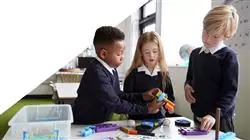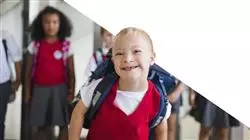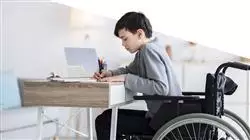University certificate
The world's largest faculty of psychology”
Introduction to the Program
Bullying and sexual abuse are more prevalent in schools than is generally believed. Enroll in this Master's Degree and start detecting this type of situations"

Educational centers should not limit themselves to imparting certain contents. This is an essential part, but many factors come into play when it comes to education. For example, that the student is in optimal conditions to carry out the learning process.
Therefore, this program offers a comprehensive view of inclusive psychology in all its dimensions. Both from the perspective of the educational institution and the role played by the psychological professional and the family. Providing tools and experiences that can be directly extrapolated to the educational centers of the graduates.
The different modules are taught with an eminently practical approach, supported by the necessary theoretical material. All teachers have extensive experience with cases of different ages and in diverse socio-family and educational contexts. In addition, it must be taken into account that inclusive learning is approached by integrating the situation of each child, their families, as well as the educational institution and the social context.
Finally, this Master's Degree stands out for being fully online, which will allow students to carry out the learning process without leaving aside their work activity, as well as the rest of their daily obligations.
Throughout the program you will obtain resources to address situations of social exclusion regardless of the student's age"
This Master's Degree in Inclusive Education for Children and Adolescents in Situations of Social Exclusion contains the most complete and up-to-date program on the market. The most important features include:
- The development of case studies presented by experts in inclusive education for children and adolescents
- The graphic, schematic, and eminently practical contents with which they are created, provide scientific and practical information on the disciplines that are essential for professional practice
- Practical exercises where self-assessment can be used to improve learning
- Its special emphasis on innovative methodologies
- Theoretical lessons, questions to the expert, debate forums on controversial topics, and individual reflection assignments
- Content that is accessible from any fixed or portable device with an Internet connection
This Master's Degree includes proven techniques for the generation of educational environments respectful of sexual diversity"
The program’s teaching staff includes professionals from the sector who contribute their work experience to this training program, as well as renowned specialists from leading societies and prestigious universities.
The multimedia content, developed with the latest educational technology, will provide the professional with situated and contextual learning, i.e., a simulated environment that will provide immersive training programmed to train in real situations.
This program is designed around Problem-Based Learning, whereby the professional must try to solve the different professional practice situations that arise during the academic year. For this purpose, the student will be assisted by an innovative interactive video system created by renowned and experienced experts.
Enroll and learn how to organize student, classroom, center or legal oriented responses"

The degree includes a review of the most recent legislation on the protection of children's rights"
Syllabus
The structure of the contents of this program has been designed by a team of high-level professionals. They come from the best educational centers and universities in the country. This team is aware of the importance of detecting and working with children at risk of social exclusion. For this reason, it has designed a complete syllabus designed for those professionals who want to broaden their knowledge and learn new methodologies and techniques.

Throughout the program you will learn about different resources such as the keys to cooperative learning or the most useful ICT applications"
Module 1. Inclusive education and social inclusion
1.1. Concept of Inclusive Education and its Key Elements
1.1.1. Conceptual Approach
1.1.2. Difference Between Integration and Inclusion
1.1.2.1. Integration Concept
1.1.2.2. Inclusion Concept
1.1.2.3. Difference Between Integration and Inclusion
1.1.3. Key Elements of Educational Inclusion
1.1.3.1. Key Strategic Aspects
1.1.4. The Inclusive School and the Education System
1.1.4.1. The Challenges of the Education System
1.2. Inclusive Education and Attention to Diversity
1.2.1. Concept of Attention to Diversity
1.2.1.1. Types of Diversity
1.2.2. Diversity and Educational Inclusion Measures
1.2.2.1. Methodological Guidelines
1.3. Multilevel Teaching and Cooperative Learning
1.3.1. Key Concepts
1.3.1.1. Multilevel Teaching
1.3.1.2. Cooperative Learning
1.3.2. Cooperative Teams
1.3.2.1. Conceptualization of Cooperative Teams
1.3.2.2. Functions and Principles
1.3.2.3. Essential Elements and Advantages
1.3.3. Benefits of Multilevel Teaching and Cooperative Learning
1.3.3.1. Benefits of Multilevel Teaching
1.3.3.2. Benefits of Cooperative Learning
1.3.4. Barriers to the Implementation of Inclusive Schools
1.3.4.1. Political Barriers
1.3.4.2. Cultural Barriers
1.3.4.3. Didactic Barriers
1.3.4.4. Strategies to Overcome Barriers
1.4. Social Inclusion
1.4.1. Inclusion and Social Integration
1.4.1.1. Definition of Integration and Elements
1.4.1.2. Concept of Social Inclusion
1.4.1.3. Inclusion vs. Integration
1.4.2. Inclusion in Education
1.4.2.1. Social Inclusion at School
1.5. Inclusive School Assessment
1.5.1. Assessment Parameters
1.6. ICT and UDL in Inclusive Schools
1.6.1. Traditional Teaching Methods
1.6.2. ICT
1.6.2.1. Concept and Definition of ICT
1.6.2.2. Characteristics of ICT
1.6.2.3. Telematics Applications and Resources
1.6.2.4. ICT in the Inclusive School
1.6.3. Universal Design for Learning
1.6.3.1. What is UDL?
1.6.3.2. UDL Principles
1.6.3.3. The Application of the UDL to the Curriculum
1.6.3.4. Digital Resources and UDL
1.6.4. Digital Media to Individualize Classroom Learning
Module 2. Teacher Preparation for Inclusive Schools
2.1. Historical and Teacher Education Evolution
2.1.1. The Old Paradigm: "Normal Schools"
2.1.1.1. What Do We Mean by Normal Schools?
2.1.1.2. Main Characteristics of Normal Schools
2.1.1.3. The Moyano Law
2.1.2. Teacher Training in the XX Century
2.1.2.1. Teacher Training at the Beginning of the Century
2.1.2.2. Teacher Training in 1914
2.1.2.3. Education in the Second Republic
2.1.2.4. Teacher Training During Franco's Dictatorship
2.1.2.5. The General Education Law of 1970
2.1.2.6. The Democratic Period LOGSE
2.1.3. Teacher Training in the XXI Century
2.1.3.1. Main Aspects of Teacher Training
2.1.3.2. New Challenges in Education
2.1.4. Legal Framework
2.1.4.1. International Regulations
2.2. Contextualization of the Inclusive School
2.2.1. Main Features
2.2.1.1. Basic Principles
2.2.1.2. Objectives of Today's Inclusive School
2.3. Teacher Training for Inclusive Education
2.3.1. Previous Aspects to Consider
2.3.1.1. Basis and Purpose
2.3.1.2. Essential Elements of the Initial Training
2.3.2. Main Theories and Models
2.3.3. Criteria for the Design and Development of Teacher Education
2.3.4. Continuing Education
2.3.5. Profile of the Teaching Professional
2.3.6. Teaching Skills in Inclusive Education
2.3.6.1. The Support Teacher Functions
2.3.6.2. Emotional Competencies
2.4. Emotional Intelligence of Teachers
2.4.1. Emotional Intelligence Concept
2.4.1.1. Daniel Goleman's Theory
2.4.1.2. The Four Phase Model
2.4.1.3. Emotional Competencies Model
2.4.1.4. Emotional and Social Intelligence Model
2.4.1.5. Theory of Multiple Intelligences
2.4.2. Basic Aspects of Teachers' Emotional Intelligence
2.4.2.1. Emotions
2.4.2.2. Self-Esteem
2.4.2.3. Self-Efficacy
2.4.2.4. The Development of Emotional Skills
2.4.3. Teacher Self-Care
2.4.3.1. Strategies for Self-Care
2.5. External Elements: Administrations, Resources and Family
2.6. Quality of Inclusive Education
2.6.1. Inclusion and Quality
2.6.1.1. Conceptualization of Quality
2.6.1.2. Dimensions in the Quality of Education
2.6.1.3. Quality Parameters in the Inclusive School
2.6.2. Successful Experiences
Module 3. The Role of the Family and the Community in Inclusive Schooling
3.1. The Diversity of Current Family Models
3.1.1. Definition of Family Concept
3.1.2. Evolution of Family Concept
3.1.2.1. The Family in the 21st Century
3.1.3. Family Models
3.1.3.1. Types of Family Models
3.1.3.2. Educational Styles in Family Models
3.1.4. Educational Attention to the Different Family Models
3.2. Family Involvement in the School
3.2.1. The Family and the School as Developmental Environments
3.2.2. The Importance of Cooperation between Educational Agents
3.2.2.1. The Management Team
3.2.2.2. The Teaching Team
3.2.2.3. The Family
3.2.3. Types of Family Participation
3.2.3.1. Direct Participation
3.2.3.2. Indirect Participation
3.2.3.3. Non-Participation
3.2.4. Parent Schools
3.2.5. The Parent-Teacher Association (PTA)
3.2.6. Difficulties in Participation
3.2.6.1. Intrinsic Participation Difficulties
3.2.6.2. Extrinsic Participation Difficulties
3.2.7. How to improve Family Participation?
3.3. The Family and the School as Developmental Environments
3.4. Society and Inclusive School
3.5. Learning Communities
3.5.1. Conceptual Framework of Learning Communities
3.5.2. Characteristics of Learning Communities
3.5.3. Creation of a Learning Community
3.6. Creation of a Learning Community
Module 4. Main psychological theories and stages of evolutionary development
4.1. Main Authors and Psychological Theories of Childhood Development
4.1.1. Psychoanalytic Theory of Child Development by S. Freud
4.1.2. E. Erikson's Theory of Psychosocial Development
4.1.3. Jean Piaget's Theory of Cognitive Development
4.1.3.1. Adaptation: The Processes of Assimilation and Accommodation lead to Equilibrium
4.1.3.2. Stages of Cognitive Development
4.1.3.3. Sensorimotor Stage (0-2 years old)
4.1.3.4. Pre-operative Stage: Pre-operative Sub-period (2-7 years old)
4.1.3.5. Stage of Concrete Operations (7-11 years old)
4.1.3.6. Formal Operations Stage (11-12 years old and older)
4.1.4 Lev Vygotsky's Sociocultural Theory
4.1.4.1. How do we Learn?
4.1.4.2. Higher Psychological Functions
4.1.4.3. Language As a Mediating Tool
4.1.4.4. Proximal Development Zone
4.1.4.5. Development and Social Context
4.2. Introduction to Early Intervention
4.2.1. History of Early Intervention
4.2.2. Definition of Early Intervention
4.2.2.1. Levels of Intervention in Early Intervention
4.2.2.2. Main Fields of Action
4.2.3. What is a CCDEA
4.2.3.1. Concept of CCDEA
4.2.3.2. Functioning of a CCDEA
4.2.3.3. Professionals and Areas of Intervention
4.3. Evolutionary Aspects of Development
4.3.1. Development from 0-3 years of age
4.3.1.1. Introduction
4.3.1.2. Motor Development
4.3.1.3. Cognitive Development
4.3.1.4. Language Development
4.3.1.5. Social Development
4.3.2. Development from 3-6 years of age
4.3.2.1. Introduction
4.3.2.2. Motor Development
4.3.2.3. Cognitive Development
4.3.2.4. Language Development
4.3.2.5. Social Development
4.4. Milestones of Alarm in Child Development
4.5. Cognitive and Socio-affective Development from 7 to 11 years of age
4.6. Cognitive Development during Adolescence and early Adulthood
Module 5. Attachment and affective bonds
5.1. Attachment Theory
5.1.1. Theoretical Basis
5.1.1.2. John Bowlby
5.1.1.3. Mary Ainsworth
5.1.2. Attachment Behaviors
5.1.3. Attachment Functions
5.1.4. Internal Representation Models
5.1.5. Ambivalent Insecure Attachment
5.1.6. Avoidant Insecure Attachment
5.1.7. Disorganized Attachment
5.2. Attachment Styles
5.2.1. Secure Attachment
5.2.1.1. Characteristics of the Subject with this Attachment Style
5.2.1.2. Characteristics of the Caregivers that Promote this Style
5.2.2. Ambivalent Insecure Attachment
5.2.2.1. Characteristics of the Subject with this Attachment Style
5.2.2.2. Characteristics of the Caregivers that Promote this Style
5.2.3. Avoidant Insecure Attachment
5.2.3.1. Characteristics of the Subject with this Attachment Style
5.2.3.2. Characteristics of the Caregivers that Promote this Style
5.2.4. Disorganized Attachment
5.2.4.1. Characteristics of the Subject with this Attachment Style
5.2.4.2. Characteristics of the Caregivers that Promote this Style
5.3. Evolution of Attachment in the Different Stages of Development
5.3.1. Attachment During Childhood
5.3.1.1. Attachment Development in Early Childhood
5.3.1.2. Attachment in the Preschool Stage
5.3.1.3. Attachment During Infancy
5.3.2. Attachment During Adolescence
5.3.2.1. Friendships: Evolution and Functions
5.3.3. Adulthood
5.3.3.1. Attachment in Adults
5.3.3.2. Differences in Attachment During Adulthood
5.3.3.3. Attachment Theory and Love Relationships in Adulthood
5.3.4. Old Age
5.3.4.1. Attachment Around Retirement
5.3.4.2. Attachment Around the Final Years of Life
5.4. Attachment and Parental Style
5.4.1. The Family as a Development Context
5.4.1.1. Parental Skills and Abilities
5.4.2. Parental Educational Styles and Bonding Styles
5.4.2.1. Authoritative/Democratic
5.4.2.2. Authoritarian/Repressive
5.4.2.3. Permissive/Indulgent
5.4.2.4. Negligent/Independent
5.4.3. Promotion of Socio-Affective Development from the Family Environment
5.5. Importance of Attachment in the Educational Context
5.5.1. Relationship of the Child with the Educator as a function of Attachment Style
5.5.1.1. Different Styles of Students According to their Temperament
5.5.1.2. Children who are Confident or Insecure about Learning
5.5.2. Educational Intervention: The Educator as a Bonding Figure
5.5.2.1. The First Bonds
5.5.2.2. Representations About Oneself, Others and Reality
5.5.2.3. The Importance of the Referring Teacher or Tutor
5.5.3. The Socio-Affective Education Curriculum
5.5.3.1. The Formal Curriculum
5.5.3.2. The Paracurriculum
5.5.4. Social and Emotional Development Programs in the Classroom
5.5.4.1. Educational Intervention in the Classroom
5.5.4.2. Relationship Between Teachers and Family/Caregivers
5.6. Psychological Disorders Explained from Attachment Theory
5.6.1. Behavior Disorders
5.6.1.1. Reactive Attachment Disorder
5.6.1.2. Attention Deficit Disorder
5.6.1.3. Oppositional Defiant Disorder
5.6.2. Personality Disorders
5.6.2.1. Borderline Personality Disorder
5.6.2.2. Dissociative Disorders
5.6.3. Anxiety Disorders
5.6.3.1. Separation Anxiety Disorder
5.6.3.2. Social Anxiety Disorder
5.6.3.3. Generalized Anxiety Disorder
5.6.3.4. Post-Traumatic Stress Disorder
5.6.4. Affective Disorders
5.6.4.1. Major Depression Disorder
5.6.4.2. Dysthymia
5.6.4.3. Bipolar Disorder
5.7. Creating Safe Contexts: Coping Capacities
5.7.1. Protective Factors and Coping Strategies
5.7.2. Risk and Vulnerability Factors
5.7.3. Coping Concepts
5.7.3.1. Resilience
5.7.3.2. Coping (Stress Coping)
5.7.3.3. Positive Parenting
Module 6. The Educational System as an Area of Social Exclusion
6.1. Exclusion in Education
6.1.1. Conception of Current Education
6.1.1.1. Traditional Education
6.1.1.2. Evolution and Problems; European Schools
6.1.1.3. Other Educational Models
6.1.2. Educational Exclusion
6.1.2.1. Concept of Educational Exclusion
6.1.2.2. Justifications for Exclusion
6.2. Inclusive Schools and Attention to Diversity
6.2.1. Current School Model (Successful Educational Actions in Compulsory Centers, Special Education Centers, Singular Educational Performance Centers).
6.2.1.1. Educational Inclusion
6.2.1.2. Attention to Diversity
6.2.2. Organization of the Educational Response
6.2.2.1. At the Educational System level
6.2.2.2. At Center Level
6.2.2.3. At Classroom Level
6.2.2.4. At Student Level
6.3. Students with SEN
6.3.1. Evolution of EE in the Last Decades
6.3.1.1. The Institutionalization of Special Education (Medical Model)
6.3.1.2. Clinical Model
6.3.1.3. Standardization of Services
6.3.1.4. Pedagogical Model
6.3.1.5. Particular Features that Have Characterized the Evolution of Special Education
6.3.2. Definition of SEN
6.3.2.1. At the Educational Level
6.3.2.2. At Social Level
6.3.3. Students with SEN in the Educational Environment
6.3.3.1. Specific Learning Difficulties
6.3.3.2. ADHD
6.3.3.3. High Intellectual Potential
6.3.3.4. Late Incorporation into the Educational System
6.3.3.5. Personal or School History Conditions
6.3.3.6. Students with SEN
6.3.4. Organization of the Educational Response for this Student Body
6.3.5. Main SEN by Areas of Development of the Students with Special Education Needs
6.4. Students with High Abilities
6.4.1. Models Definition
6.4.2. Precocity, Talent, Giftedness
6.4.3. Identification and SEN
6.4.4. Educational Response
6.4.4 1. Acceleration
6.4.4 2. Grouping
6.4.4 3. Enrichment Programs
6.4.4 4. Ordinary Measures Center
6.4.4 5. Ordinary Measures Classroom
6.4.4 6. Extraordinary Measures
6.5. Inclusion and Multiculturalism
6.5.1. Conceptualization
6.5.2. Strategies to Respond to Multiculturality
6.5.2.1. Classroom Strategies
6.5.2.2. Internal and External Classroom Support
6.5.2.3. Adequacy to the Curriculum
6.5.2.4. Organizational Aspects
6.5.2.5. Center-Environment Cooperation
6.5.2.6. Collaboration from the Institution
6.6. Cooperative Learning
6.6.1. Theoretical Basis/Approaches
6.6.1.1. Socio-Cognitive Conflict
6.6.1.2. Conceptual Controversies
6.6.1.3. Help Between Schoolchildren
6.6.1.4. Interaction and Cognitive Processes
6.6.2. Cooperative Learning
6.6.2.1. Concept
6.6.2.2. Features
6.6.2.3. Components
6.6.2.4. Advantages
6.6.3. Training of the Teaching Staff
6.6.4. Cooperative Learning Techniques
6.6.4.1. Jigsaw Technique
6.6.4.2. Team Learning
6.6.4.3. Learning Together
6.6.4.4. Group Research
6.6.4.5. Co-op
6.6.4.6. Guided or Structured Cooperation
6.7. Coeducation
6.7.1. What is Meant by Coeducation?
6.7.1.1. Homophobia
6.7.1.2. Transphobia
6.7.1.3. Gender Violence
6.7.1.4. How to Work on Equality in the Classroom? (Prevention from the Classroom)
6.8. The Social Climate in the Classroom
6.8.1. Definition
6.8.2. Influencing Factors
6.8.2.1. Social Factors
6.8.2.2. Economic Factors
6.8.2.3. Demographic Factors
6.8.3. Key Agents
6.8.3.1. The Role of the Teacher
6.8.3.2. The Role of the Student
6.8.3.3. The Importance of Families
6.8.4. Assessment
6.8.5. Intervention Programs
Module 7. The child protection system
7.1. Legislative and Conceptual Framework
7.1.1. International Regulations
7.1.1.1. Declaration of Rights of the Child
7.1.1.2. Principles of the United Nations General Assembly
7.1.1.3. United Nations Convention on the Rights of the Child
7.1.1.4. Other Regulations
7.1.2. Legislative Developments in Spain
7.1.2.1. The Spanish Constitution
7.1.2.2. Organic Law 1/96 on the Legal Protection of Minors
7.1.2.3. The Civil Code and Law 21/87 from Which it is Modified
7.1.2.4. Organic Law 8/2015, on the Modification of the Child and Adolescent Protection System
7.1.2.5. Law 26/2015 on the Modification of the Child and Adolescent Protection System
7.1.3. Basic Principles of Protective Intervention
7.1.4. Basic Concepts of the Child Protection System
7.1.4.1. Concept of Protection
7.1.4.2. Concept of Vulnerability
7.1.4.3. Risk Situations
7.1.4.4. Helpless Situation
7.1.4.5. Safeguarding
7.1.4.6. Guardianship
7.1.4.7. The Best Interest of the Child
7.2. Foster Care for Minors
7.2.1. Theoretical and Conceptual Framework
7.2.1.1. Evolution Over Time
7.2.1.2. Theories of Intervention with Families
7.2.2. Types of Family Foster Care
7.2.2.1. Kinship Foster Care
7.2.2.2. Family Placement Foster Care
7.2.3. Stages of Family Foster Care
7.2.3.1. Purpose of the Family Foster Care
7.2.3.2. Principles of Action
7.2.3.3. Stages of the Intervention
7.2.4. Foster Care from the Children's Perspective
7.2.4.1. Preparation for Foster Care
7.2.4.2. Fears and Resistance
7.2.4.3. Foster Family and Family of Origin
7.3. Residential Foster Care for Minors
7.3.1. Definition and Typology of Juvenile Centers
7.3.1.1. Reception Centers
7.3.1.2. Reception Centers II
7.3.1.3. Functional Homes
7.3.1.4. Emancipation Centers
7.3.1.5. Day Centers for Labor Market Insertion
7.3.1.6. Day Care Centers for Convivial and Educational Support
7.3.1.7. Reform Centers
7.3.2. Residential Care Principles and Criteria
7.3.2.1. Protective Factors
7.3.2.2. Resident Children's Needs
7.3.3. Main Areas of Intervention from the Centers
7.3.3.1. Stages of the Intervention
7.3.3.2. Rights and Duties of the Children
7.3.3.3. Group Intervention
7.3.3.4. Individual Intervention
7.3.4. Profiles of Children Served
7.3.4.1. Behavioral and Mental Health Problems
7.3.4.2. Filio-Parental Violence
7.3.4.3. Juvenile Offenders
7.3.4.4. Unaccompanied Foreign Minors
7.3.4.5. Accompanied Foreign Minors
7.3.4.6. Preparation for Independent Living
7.4. Adoption of Children
Module 8. The Educational Environment in Relation to the Students Under Guardianship
8.1. Characteristics of the Supervised Student
8.1.1. Characteristics of Supervised Children
8.1.2. How Does the Profile of Supervised Children Affect the School Setting?
8.1.3. The Approach from the Educational System
8.2. Students in Foster Care and Adoption
8.2.1. The Process of Adaptation and Integration to the School
8.2.2. Student Needs
8.2.2.1. Needs of Adopted Children
8.2.2.2. Needs of Children in Foster Care
8.2.3. Collaboration Between School and Families
8.2.3.1. School and Adoptive Families
8.2.3.2. School and Foster Families
8.2.4. Coordination Between the Social Agents Involved
8.2.4.1. The School and the Protection System (Administrations, Monitoring Entities)
8.2.4.2. The School and the Health System
8.2.4.3. School and Community Services
8.3. Students Coming from Reception Centers
8.3.1. The Integration and Adaptation in School
8.3.2. Needs of Children in Foster Care
8.3.3. Collaboration Between School and Protection Centers
8.3.3.1. Collaboration Between Administrations
8.3.3.2. Collaboration Between the Teaching Team and the Center's Educational Team
8.4. Life History Work
8.4.1. What Do We Mean by Life History?
8.4.1.1. Areas to be Covered in the Life History
8.4.2. Support in Life History Work
8.4.2.1. Technical Support
8.4.2.2. Family Support
8.5. Educational Itineraries
8.5.1. Compulsory Education
8.5.1.1. The Legislative treatment of Students in Guardianship or at Risk of Exclusion
8.5.2. Secondary Education
8.5.2.1. Intermediate Level Training Cycles
8.5.2.2. High School
8.5.3. Higher Education
8.6. Alternatives After Reaching Legal Age
8.6.1. Socio-Labor Insertion
8.6.1.1. The Concept of Socio-Labor Insertion
8.6.1.2. Orientation
8.6.1.3. Professional Training and Education
8.6.2. Other Alternatives
Module 9. Action by Schools in the Event of Child Abuse Situations
9.1. Child Abuse
9.1.1. Definition and Conceptualization of Child Abuse
9.1.1.1. Definition
9.1.1.2. Conceptualization of Abuse in Terms of:
9.1.1.2.1. Time of Development at Which it Occurs
9.1.1.2.2. Who Causes the Abuse? (Context in Which They Take Place)
9.1.1.2.3. The Specific Action or Omission that is Occurring
9.1.1.2.4. Intentionality of Abuse
9.1.2. The Social Importance of Identifying Child Abuse
9.1.2.1. Basic Needs in Childhood
9.1.2.2. Risk and Protective Factors
9.1.2.3. Intergenerational Transmission of Abuse
9.1.3. Situation of Risk and Situation of Helplessness
9.1.3.1. Concept of Risk
9.1.3.2. Concept of Helplessness
9.1.3.3. Risk Assessment Protocol
9.2. Child Abuse: General Characteristics and Main Types
9.2.1. Passive Abuse: Omission, Neglect or Abandonment
9.2.1.1. Definition and Alarm Indicators
9.2.1.2. Incidence and Prevalence
9.2.2. Physical Abuse
9.2.2.1. Definition and Alarm Indicators
9.2.2.2. Incidence and Prevalence
9.2.3. Abuse and Emotional Neglect
9.2.3.1. Definition and Alarm Indicators
9.2.3.2. Incidence and Prevalence
9.2.4. Sexual Abuse
9.2.4.1. Definition and Alarm Indicators
9.2.4.2. Incidence and Prevalence
9.2.5. Other Types of Abuse
9.2.5.1. Children Victims of Gender Violence
9.2.5.2. Transgenerational Cycle of Child Abuse
9.2.5.3. Münchhausen Syndrome by Proxy
9.2.5.4. Harassment and Violence through Social Networks
9.2.5.5. Peer Abuse: Bullying
9.2.5.6. Filioparental Violence
9.2.5.7. Parental Alienation
9.2.5.8. Institutional Abuse
9.3. Consequences of Child Abuse
9.3.1. Indicators of Abuse
9.3.1.1. Physical Indicators
9.3.1.2. Psychological, Behavioral and Emotional Indicators
9.3.2. Consequences of Abuse
9.3.2.1. Impact of Physical and Functional Development
9.3.2.2. Consequences on Cognitive Development and School Performance
9.3.2.3. Effects on Socialization and Social Cognition
9.3.2.4. Disorders in the Development of Attachment and Affection, Emotional Relationship Development
9.3.2.5. Behavioral Problems
9.3.2.6. Childhood Trauma and Post-Traumatic Stress Disorder
9.4. Intervention Against Abuse in Schools: Prevention, Detection and Reporting
9.4.1. Prevention and Detection
9.4.2. Action Protocol
9.4.2.1. Identification
9.4.2.2. Immediate Actions
9.4.2.3. Notification
9.4.2.4. Communication of the Situation
9.4.2.5. Emergency Procedure
9.4.3. School Intervention in Child Abuse Cases
9.5. Peer Abuse: Bullying
9.5.1. Risk Factors and Protective Factors of School Violence
9.5.2. Protocols of Action from the School Center
9.5.3. Guidelines for its Prevention and Treatment
9.6. Filioparental Violence
9.6.1. Explanatory Theories
9.6.1.1. The Cycle of Violence
9.6.2. Prevention and Intervention Against Filioparental Violence
9.7. Networking: School, Family and Social Services
Module 10. School mediation as a tool for inclusion
10.1. Conflicts in the Educational Environment
10.1.1. Conceptualization of Conflict
10.1.1.1. Theorizing About Conflict
10.1.1.2. Types of Conflicts
10.1.1.3. Psychological Aspects of Conflict
10.1.2. The Conflict in the Classroom
10.1.2.1. School Climate
10.1.2.2. Why Do Conflicts Arise in the Classroom?
10.1.2.3. Types of Conflict in the Classroom
10.1.2.4. Conflicts that Can Be Mediated
10.1.2.5. The Importance of Communication and Dialogue
10.2. Mediation and School Mediation
10.2.1. Concept of Mediation
10.2.1.1. Legislative Aspects
10.2.2. Mediation Models
10.2.2.1. The Traditional Model
10.2.2.2. The Narrative Model
10.2.2.3. The Transforming Model
10.2.3. School Mediation
10.2.3.1. Evolution of School Mediation
10.2.3.2. Main Features
10.2.3.3. Principles of School Mediation
10.2.3.4. Pedagogical Dimension and Benefits of Mediation
10.3. Phases of School Mediation
10.3.1. Pre-Mediation
10.3.1.1. Techniques and Strategies
10.3.2. Entrance
10.3.2.1. Techniques and Strategies
10.3.3. Tell Me About It
10.3.3.1. Techniques and Strategies
10.3.4. Situating the Conflict
10.3.4.1. Techniques and Strategies
10.3.5. Search for Solutions
10.3.5.1. Techniques and Strategies
10.3.6. The Agreement
10.3.6.1 Techniques and Strategies
10.4. The Implementation of school Mediation Programs
10.4.1. Types of Programs
10.4.2. Program Implementation and Equipment Selection
10.4.2.1. Mediator Training
10.4.3. Organization, Coordination and Monitoring
10.4.4. Program Assessment
10.4.4.1. Assessment Criteria
10.5. Other Conflict Resolution Techniques

Master's Degree in Inclusive Education for Children and Adolescents in Situations of Social Exclusion
Inclusive education is an increasingly relevant area in the field of education, as it seeks to provide equal academic opportunities to children and adolecents in situations of social exclusion. Consequently, more and more schools are betting on having psychologists who master the most advanced procedures and interventions in this area, in order to preserve the welfare of students. In order for you to achieve a professional update in this area and boost your career, TECH has created the Master's Degree in Inclusive Education for Children and Adolescents in Situations of Social Exclusion.
Study a prestigious academic program
Learn, through this Master's Degree in Inclusive Education for Children and Adolescents in Situations of Social Exclusion, the role played by the educational environment in foster children, the avant-garde protocols of intervention in cases of child abuse or mediation techniques that promote inclusion in the school environment. All this, through an excellent and modern methodology of teaching 100% online, which will enable you to study without the need to move from your own home. This is the opportunity you were looking for to achieve your desired professional growth in the easiest way!







